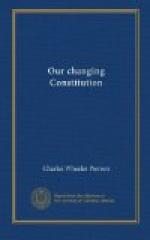when Congress acts within
the limits of its constitutional
authority, it is not
the province of the judicial branch of
the Government to question
its motives.[5]
[Footnote 1: Veazie Bank v. Fenno, 8 Wall., 533, decided in 1870.]
[Footnote 2: McCray v. United States, 195 U.S., 27, decided in 1904.]
[Footnote 3: United States v. Doremus, 249 U.S., 86, decided in 1919.]
[Footnote 4: 38 Stat., 785.]
[Footnote 5: Smith v. Kansas City Title Company, 255 U.S., 180, 210.]
In the Narcotic Drug Act case[1] the Court held
While Congress may not exert authority which is wholly reserved to the states, the power conferred by the Constitution to levy excise taxes, uniform throughout the United States, is to be exercised at the discretion of Congress; and, where the provisions of the law enacted have some reasonable relation to this power, the fact that they may have been impelled by a motive, or may accomplish a purpose, other than the raising of revenue, cannot invalidate them; nor can the fact that they affect the conduct of a business which is subject to regulation by the state police power.
[Footnote 1: United States v. Doremus, 249 U.S., 86.]
It is true that, while the Supreme Court may not question congressional motives, it cannot escape the obligation to construe a statute in the light of its true nature and effect. The Court has said:[1]
The direct and necessary result of a statute must be taken into consideration when deciding as to its validity, even if that result is not in so many words either enacted or distinctly provided for. In whatever language a statute may be framed, its purpose must be determined by its natural and reasonable effect.
[Footnote 1: Collins v. New Hampshire, 171 U.S., 30.]
As already indicated, however, the nature and effect of a statute must ordinarily be determined from the form and contents of the act itself, rather than from outside sources, and the measure under consideration purports to be a revenue act.
In the light of the decisions and principles of interpretation to which reference has been made, the case against the constitutionality of the act may seem well-nigh hopeless. The fact remains, however, that Congress has not met the fundamental objection raised by the Supreme Court. The Court declared the former act unconstitutional, not only because it transcended the power of Congress under the particular provision of the Constitution then invoked, viz., the Commerce Clause, but also on the broad ground of state rights, because it “exerts a power as to a purely local matter to which the federal authority does not extend.” It is difficult to see how this objection is obviated by reenacting the act as a revenue measure. Under the circumstances perhaps the apprehensive foes of federal encroachment should withhold their lamentations until the Supreme Court has spoken again.[1]




